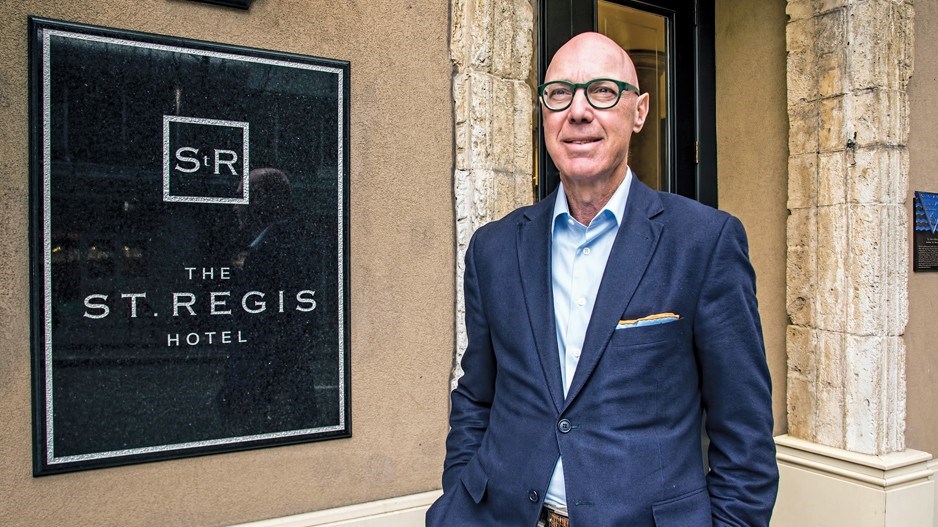For years he has urged governments to balance their budgets, but during the pandemic Macdonald Development Corp. owner Robert Macdonald has advocated for deficit spending.
He praised the federal Liberal government for its “exceptional” understanding of the crushing blow that the pandemic has inflicted on the hospitality and tourism sectors, and the financial support that has flowed.
“It’s allowed us to survive,” Macdonald told BIV. “I’m extremely grateful on behalf of the restaurants that we own and the hotel business that we’re in.”
Macdonald owns Vancouver’s St. Regis Hotel and has a 50% stake in Gotham Steakhouse & Bar and five Hy’s Steakhouse
restaurants across Canada.
He would like the federal government in its April 19 budget to extend its Canada Emergency Wage Subsidy (CEWS) program and its Canada Emergency Rent Subsidy (CERS) program past June, when both programs are set to end.
Those programs provide financial help to businesses that have had significant revenue declines, and they have widespread support among those in the industry.
BC Hotel Association CEO Ingrid Jarrett told BIV that she wants the federal government to extend CEWS and the CERS until the end of 2021. She also wants Ottawa to raise the maximum value of loans provided under its Highly Affected Sectors Credit Availability Program to $25 million, up from $6.25 million, and for those loan ceilings to be on a per-location basis instead of as a cumulative total.
The program’s current maximum loan values don’t provide enough liquidity, or relief, for the program to be helpful, she said.
Aviation advocates have long been calling for the federal government to provide financial assistance to airlines.
Ottawa on April 12 announced a plan to provide up to $5.9 billion in loans to Air Canada through the Large Employer Emergency Financing Facility (LEEFF), which is a program aimed at supporting large Canadian employers who have lost revenue due to COVID-19.
Other airlines have also accessed the LEEFF program. Sunwing, for example, secured $375 million in loans through the LEEFF program in February.
Barret Armann, president of Unifor Local 7378, which represents 451 laid-off Sunwing Vacations pilots, told BIV that his biggest request is to have Ottawa extend its CEWS program past June. Other than that, he would like lower interest rates on the LEEFF loans.
Finance Minister Chrystia Freeland said April 12 that discussions with other airlines about financial assistance are ongoing.
In addition to the federal budget, the B.C. government is set to reveal its budget on April 20.
One main item on Jarrett’s wish list for B.C.’s budget is easier business access to B.C.’s Small and Medium Sized Business Recovery Grant (SMSBRG) program.
“We have 49% of our industry that has not been successful in accessing those funds,” Jarrett said.
The association also wants the provincial government to create a structure to help businesses pay their property taxes, BC Hydro bills and other fixed costs.
“Without some kind of a relief mechanism to support those businesses, they simply won’t be in business,” she said.
Nova Scotia and Ontario have supported cities financially so their municipal governments can give property-tax relief to businesses while still providing garbage collection and other needed services.
Under Nova Scotia’s system, businesses get a property tax discount equivalent to the percentage of their revenue decline, Jarrett said.
That is the kind of program that Glowbal Group owner Emad Yacoub has been advocating.
"If our business dropped by 50%, we should be allowed for 2020-2021 to pay 50% of the property taxes," he said.
Yacoub is one of the businesses that has also been frustrated with the B.C. government's SMSBRG program.
He submitted paperwork showing his revenue and his costs. Provincial bureaucrats then came back to him and said that they would only allow him to apply toward his grant request costs that were racked up after September 18.
"This makes no sense," Yacoub said. "When the government had its restart in May, we reopened. We had to make the business COVID-safe. So why are they only calculating expenses after September 18, when businesses had already put in their investments?"
Recommended government actions from B.C.’s tourism task force report released in December included:
•an additional $95 million emergency fund;
•postponement until December 2022 of any fixed costs, such as property taxes, utility rates and tenure or other Crown fees;
•a government incentive program to encourage travel within B.C.;
•a ‘Welcome to B.C.’ program to encourage domestic and international visits when borders reopen; and
•better data-gathering on COVID-19’s effects on the sector.
“We remain resolved that the provincial government needs to take action on those recommendations,” Jarrett said. •




